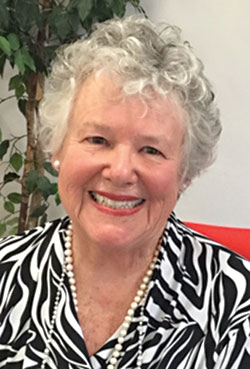
URBANNA — Every so often I have a knock your socks off kind of experience. A recent dinner at Hazel and David Laughton’s house on Route 227 just outside of Urbanna earns such a rating.
The couple, married 63 years, hail from Birmingham, England. At an early age, in spite of growing up in the horror of World War II England and withstanding Nazi bombings in early childhood, they decided to live a life “well lived.”
David explained that meant following their dreams and going to sea as soon as possible. They quit their jobs and bought a 24-foot sailboat in need of repair and set off with their dog, Tramp, for adventures that could compete with Defoe’s “Robinson Crusoe” or Dana’s “Two Years Before the Mast.”
David is soon publishing a book relating their tales sailing off to sea in such a tiny boat. The tales are full of terror, joy, humor, fright and fulfillment as they sail down the coast of England in seas that would send most of us back to land as fast as we could go.
But they weathered on to France, down the coast of Europe, Gibraltar and on to Greece and even across the Atlantic Ocean.
Fortunately the 24-foot boat was eventually replaced by much larger and more seaworthy boats and ending up with a beautiful 50-plus footer.
Expect to read about a ship crashing into them while they were at dock and barely managing to escape alive. Poor Hazel was thrown on the dock at the last minute saved by David who then jumped to safety.
Then, their boat blew up and sank in the ocean as they spent many hours at sea in a blow-up raft wondering whether they would ever achieve that elusive end in their “pursuit of happiness.”
Hazel recalled one hilarious memory during that desperate time when David said … “My next boat is going to have a proper dinghy!” (Anyone who can plan for the next boat while marooned in the middle of the ocean in a rubber raft is the definition of an optimist.) They were eventually saved by a passing Norwegian ship.
Hazel made us an authentic English dinner of cottage pie, and David, not to be outdone in a marriage that contains the spark of highly competitive inter-action between husband and wife, created a treacle tart. I had never tasted treacle before, which is a syrup derived from sugar cane.
The dinner included a visit through David’s workshop filled with many exotic cars. He is presently restoring a 1903 Olds and a Land Rover that had been stripped down to the bare bones as David is totally reworking every square inch of the car.
One quality of David that stands out is absolute fearlessness. Once he and Hazel were crossing Baltimore’s Key Bridge, the one that has recently been destroyed by a ship crashing into it. The night was dark and stormy with gale force winds topping 50 mph. As they crossed over, a hood to an expensive car he was towing flew off and when they reached the other side, he pulled over and left Hazel in search on foot across the bridge for his lost hood.
There were no walk spaces for pedestrians and when the big semis came toward him in the night he had to jump up on the parapet and wait until the trucks passed.
Soon Hazel waiting back in the car heard over the police radio there was a “jumper” on the bridge and all police cars in the area were ordered to the bridge as fast as possible and to stop traffic. Soon there were eight cop cars circling David.
“What are you doing?” one policeman called to David who explained he was looking for his lost hood. The hood was found and returned to David. Another cop car came in sirens blazing. “Did you find the jumper in time?” the policeman shouted.
“No worry, he’s English,” was the response.
Over the years David and Hazel have enjoyed adventure and good living buying up and restoring old cars. They attend many car shows.
They are both busy in the community too — Hazel serving as president of Yacht Harbor Association and an active member of the Woman’s Club and David is an invaluable helper to the many boat owners at the docks near Urbanna Creek.
David has a sign in his home to welcome all guests that reads … “Please let us know if you are offended with anything here that we say or do so we can enjoy a good laugh.”
Which describes him to a T. He laughs at human behavior, marches to his own tune, and enjoys life to the fullest. Too bad more people aren’t so inclined, for David very well may have discovered the secret to happiness in life.
I can’t imagine life in Urbanna without this interesting and fun-loving pair!
© 2024
(Note: One Woman’s Opinion columnist Mary Wakefield Buxton will be taking some time off from writing her column.)



